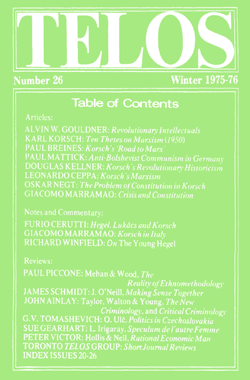As an occasional feature on TELOSscope, we highlight a past Telos article whose critical insights continue to illuminate our thinking and challenge our assumptions. Today, Tomash Dabrowski looks at Karl Korsch’s “Ten Theses on Marxism Today,” from Telos 26 (Winter 1975–76).
 Although the work of Karl Korsch was cardinal to subsequent theoretical developments within the twentieth-century Marxist canon, the appreciation of his work is usually eclipsed in intellectual history by the long shadow cast by Lukács over the development of what would later be called “Western Marxism.” Nevertheless, the belated rediscovery of Korsch’s work by the New Left was certainly in part due to the fact that Korsch’s position was the more heretical in the eyes of the Soviet variant of Marxist orthodoxy. Although Lukács dismissed the dogmatic hagiography of Marx’s conclusions, he nevertheless introduced his magnum opus, History and Class Consciousness, with the “scientific conviction” in the method of dialectical materialism. Even provided that all of Marx’s findings would be proven false, genuine Marxist method would nevertheless yield a privileged relationship to history.
Although the work of Karl Korsch was cardinal to subsequent theoretical developments within the twentieth-century Marxist canon, the appreciation of his work is usually eclipsed in intellectual history by the long shadow cast by Lukács over the development of what would later be called “Western Marxism.” Nevertheless, the belated rediscovery of Korsch’s work by the New Left was certainly in part due to the fact that Korsch’s position was the more heretical in the eyes of the Soviet variant of Marxist orthodoxy. Although Lukács dismissed the dogmatic hagiography of Marx’s conclusions, he nevertheless introduced his magnum opus, History and Class Consciousness, with the “scientific conviction” in the method of dialectical materialism. Even provided that all of Marx’s findings would be proven false, genuine Marxist method would nevertheless yield a privileged relationship to history.
In contradistinction, Korsch consistently emphasized the fluidity of revolutionary thought, which by necessity must become reflectively aware of its position in local historical circumstance. Throughout his work, Korsch insisted that the historical development of theoretical understanding was to be judged by its political efficacy. By returning the Hegelian origins proper to the philosophical component of Marxism, he aimed to restore the validity of Marxist theory, which had been waning under its institutionalized vulgarizations. Although the conclusions of his earlier work yielded a personal identification with Leninism, Korsch, unlike the later Lukács, became entirely opposed to the Soviet strain of Marxism. Whereas Marx’s “Theses on Feuerbach” were directed at the anachronisms in Hegel’s intellectual heirs, Korsch’s “Theses” redirect the gesture against the pious students of Marx: “Today, all attempts to re-establish the Marxist doctrine as a whole in its original function as a theory of the working class’s social revolution are reactionary Utopias” (40).
Indeed, the well-known eleventh thesis is elliptically present in Korsch’s short polemic in identifying an important problem in the heart of the Marxist tradition. Insofar as the debates of the previous century are at variance with contemporary struggles, the canon must be re-evaluated in order to be salient to praxis grounded in present historical circumstances. Marx of course could not escape history, and therefore, Korsch maintains, he was rather limited in his analysis to contemporary scholarship in political economy and the bourgeois form of revolution. Thus Marx could only speculate that the development of capitalism was to follow the trajectory of the advanced industrial economy of England and, moreover, that the desideratum of class struggle was the proletarian overtaking of the state.
The historical disparity between Marx and Soviet ideology is for Korsch—who is perhaps too enthusiastic in taking the Soviet variant as immanent to the work of Marx—disastrous. However, Korsch is unconcerned with restoring Marx’s work in its original purity in opposition to its later employment. His theses, in fact, begin with the point that “[i]t no longer makes sense to ask to what extent the teaching of Marx and Engels is, today, theoretically acceptable and practically applicable” (40). In fact, Korsch goes as far as to dismiss the privilege of Marx within the Marxist canon. Marx’s precursors and intellectual enemies—from More to Bakunin—are assigned an equal role in Marxist theory, provided that facets of their thought clarify local historical developments. However, it is worth addressing the same question of prescience against Korsch. The “Today” in the title of his theses is certainly not ours, and the way in which he unfairly reads the Soviet dissemination of Marx back into his corpus—if only for political leverage against more dogmatic interpretations—perhaps has little relevance at the end of history. After all, it is almost too banal to observe that the late obituaries of Marx are far more ubiquitous than those nostalgic for Bolshevism.
However, as Korsch observes, that the textual authority of Marx cannot give a final verdict on social relations does not mean that this privilege ought to be conceded to the Owl of Minerva. The conclusion, whereby Marxism is absolved of the sins of those who had erroneously cited Marx, rather implies a creative process whereby intellectual history is not made obsolete by subsequent historical developments, but instead is creatively appropriated for present struggles. That the hegemony of Marx within Marxism has receded has since been expedient to radical movements in the late twentieth century. Certainly the proliferation of many Marxisms has precipitated more radically democratic mobilization, which is to be testified to by, for instance, Autonomia in Italy. For the “first step in re-establishing a revolutionary theory and practice consists in breaking with that Marxism which claims to monopolize revolutionary initiative as well as theoretical and practical direction” (40).
Read the full version of Karl Korsch’s “Ten Theses on Marxism Today” at the Telos Online website. If you are affiliated with an institution that is an online subscriber to Telos, you have free access to our complete online archive. If not, you can purchase 24-hour access to this and other Telos articles at a per-article rate. Follow the article link for more details.








